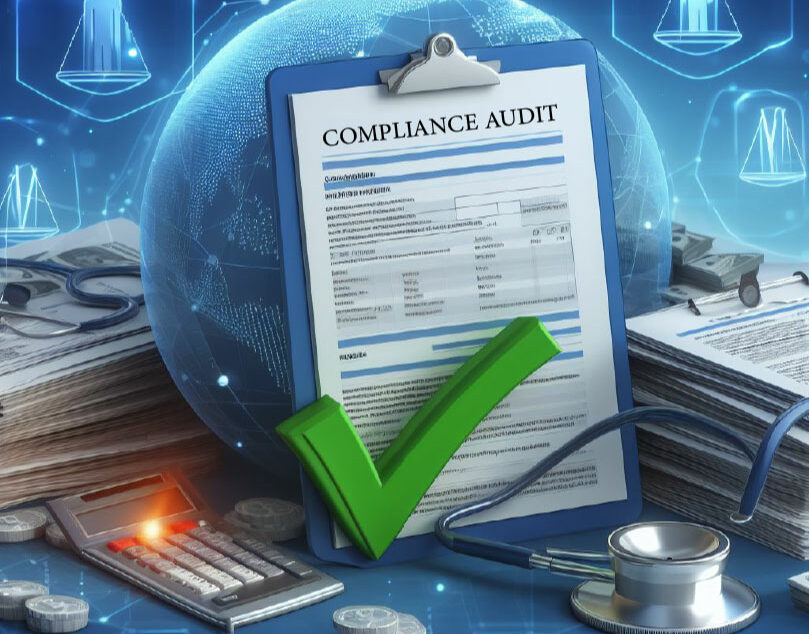
The Role of Compliance Audits in Billing Services
Medical Billing services play a pivotal role in the financial health of healthcare organizations. To ensure accuracy, transparency, and adherence to regulatory standards, compliance audits in billing services have become an indispensable practice. Compliance audits in billing services are designed to guarantee the alignment of healthcare organizations with the ever-shifting landscape of regulatory standards.
Beyond a mere checklist of rules, these audits are a proactive stance, a strategic plan to identify errors, prevent fraudulent activities, and foster a culture of transparency. In this blog, we’ll discuss the vital role compliance audits play in medical billing services and how partnering with experts can transform the financial landscape for healthcare providers.
Understanding Compliance Audits in Billing Services
Compliance audits in billing services are systematic reviews of billing records, coding practices, and documentation processes. Their primary aim is to ensure that healthcare organizations adhere to regulatory standards, detect and rectify errors, and prevent fraudulent billing activities.
Billing services compliance involves the meticulous adherence to established rules and regulations governing financial transactions in the healthcare sector. This encompasses a range of areas, including accurate coding, proper documentation, and transparent billing practices.
Important Factors of Compliance Audits in Billing
1. Healthcare Billing Audits
These audits are tailored to the unique nuances of healthcare billing. They scrutinize coding accuracy, proper documentation of medical services, and adherence to billing guidelines specific to the healthcare industry.
2. Revenue Cycle Management Audits
A comprehensive approach, revenue cycle management audits focus on optimizing the entire financial process, from patient encounters to reimbursement. This includes assessing billing efficiency, identifying revenue leakage, and streamlining the revenue cycle.
3. Healthcare Billing Regulations
Navigating the intricate web of healthcare billing regulations is an integral part of compliance audits. This ensures that billing practices align with industry standards, including those set forth by entities like the Centers for Medicare & Medicaid Services (CMS).
4. Revenue Cycle Optimization
Optimizing the revenue cycle is a central goal of compliance audits. By identifying bottlenecks, improving coding accuracy, and streamlining documentation, these audits contribute to a more efficient and effective revenue cycle.
Impact of Compliance Audits on Financial Health
1. Ensuring Accuracy and Reducing Errors
Accurate billing is paramount to the financial success of healthcare organizations. Compliance audits play a pivotal role in detecting and mitigating errors in coding and documentation, minimizing the risk of financial discrepancies. According to a survey conducted by the Healthcare Financial Management Association (HFMA), organizations that conduct regular compliance audits report a 20% reduction in billing errors.
2. Adhering to Healthcare Billing Regulations
With the ever-evolving landscape of healthcare regulations, compliance audits ensure organizations stay current and adhere to the latest guidelines. Failure to comply can lead to severe penalties. Data from the Office of Inspector General (OIG) indicates that non-compliance with billing regulations resulted in over $2.6 billion in settlements in a single year.
Technology's Role in Compliance Audits
As with many facets of the healthcare industry, technology is transforming the landscape of compliance audits in billing services. Automation, real-time monitoring, and data analytics are becoming integral components of effective compliance audit strategies.
1. Automation for Efficiency
Automated tools streamline the audit process, reducing manual efforts and enhancing efficiency. This not only saves time but also allows for more in-depth analysis of billing data.
2. Real-time Monitoring
Technology enables real-time monitoring of billing activities, allowing organizations to promptly address issues as they arise. This proactive approach minimizes the impact of potential financial discrepancies.
3. Data Analytics for Insights
Utilizing data analytics provides valuable insights into billing trends and areas for improvement. Decision-makers can leverage this information to make informed choices that positively impact overall billing performance.
Conclusion: A Proactive Approach to Financial Health
In conclusion, compliance audits in billing services are not merely a regulatory requirement but a proactive strategy to safeguard the financial health of healthcare organizations. By ensuring accuracy, adherence to regulations, and leveraging technology, organizations can optimize their revenue cycles, minimize errors, and navigate the complexities of the healthcare billing landscape successfully.
Embrace the power of compliance audits with AltuMED. Contact our experts today to get started on a journey towards compliant and improved Medical Billing Services.
Subscribe to Our Newsletter!
Subscribe to Our Newsletter!
Enter Your Email Address. We Promise We Won't Spam You
